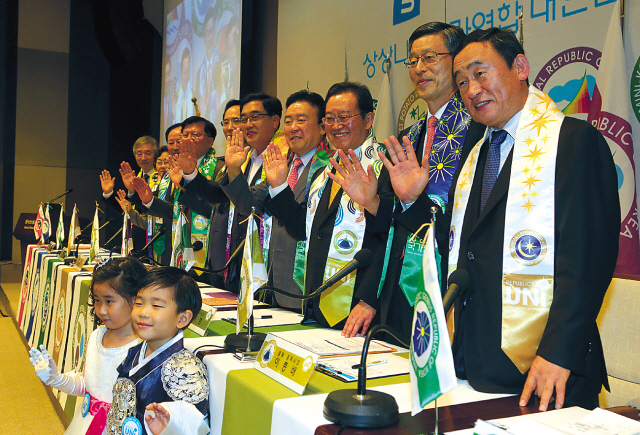A group of nine provincial governments and a private “micronation” created a regional tourism network this week to promote diverse travel programs in different provinces in Korea.
Nine mayors of provincial governments and the CEO of the Republic of Naminara, a privately owned island in Chuncheon, Gangwo n Province, launched the travel consortium The United Nations of Imagination to promote regional tourism.
“Nami Island declared itself a micronation in 2006; it has become a famous tourist destination. Many provincial governments started to pay attention to how we succeeded. We decided to create a network with the provincial governments sharing the common goal in terms of tourism,” said Kang Woo-hyon, CEO of Republic of Naminara.
Nine mayors of provincial governments and the CEO of the Republic of Naminara, a privately owned island in Chuncheon, Gangwo n Province, launched the travel consortium The United Nations of Imagination to promote regional tourism.
“Nami Island declared itself a micronation in 2006; it has become a famous tourist destination. Many provincial governments started to pay attention to how we succeeded. We decided to create a network with the provincial governments sharing the common goal in terms of tourism,” said Kang Woo-hyon, CEO of Republic of Naminara.

The participating governments include Gwangjin and Gangnam district offices in Seoul; Yeoju, Gapyeong and Yangpyeong in Gyeonggi Province; Yangu in Gangwon Province; Chungju in North Chungcheong Province and Cheongsong in North Gyeongsang Province.
“The 10 regions will share a common passport, currency, language and promote travel programs and local products together and become leading travel destinations,” said Kang.
The consortium has been spearheaded by Kang who currently serves as chief executive of The Republic of Naminara, which “declared” cultural independence and invented its own passport, currency and stamp and invited ambassadors of foreign countries.
According to Kang, there are about 120 micronations around the world attracting many visitors after declaring independence and creating own administrative systems.
“Isn’t it just fun? We need to focus on what entertains people and keep them interesting,” said Kang.
He sees such consortium will help Korea draw more tourists in the future.
“Now is the time to focus on interesting content in regional tourism promotion. The United Nations of Imagination will be the frontier attracting an extra 10 million tourists to Korea,” Kang said.
The number of foreign tourists to Korea is expected to reach 10 million this year, according to the Korea Tourism Organization.
Each provincial government nicknamed their region based on their special local products or travel resources.
Gwangjin district in Seoul renamed itself “The Republic of Fairytales,” as it holds a children’s book festival every year. Gangnam district is called “The Republic of the Beautiful” for its flourishing medical tourism. Yeoju was named “The Republic of Sweet Potato” derived from its sweet potato festival.
“We are dreaming up a new trend that will change the face of tourism in Korea. I hope the new concept will help Korean tourism develop, not in terms of tourist numbers, but through interesting travel programs and content that will ensure a steady flow of tourists,” said Kang.
By Lee Woo-young (wylee@heraldcorp.com)
“The 10 regions will share a common passport, currency, language and promote travel programs and local products together and become leading travel destinations,” said Kang.
The consortium has been spearheaded by Kang who currently serves as chief executive of The Republic of Naminara, which “declared” cultural independence and invented its own passport, currency and stamp and invited ambassadors of foreign countries.
According to Kang, there are about 120 micronations around the world attracting many visitors after declaring independence and creating own administrative systems.
“Isn’t it just fun? We need to focus on what entertains people and keep them interesting,” said Kang.
He sees such consortium will help Korea draw more tourists in the future.
“Now is the time to focus on interesting content in regional tourism promotion. The United Nations of Imagination will be the frontier attracting an extra 10 million tourists to Korea,” Kang said.
The number of foreign tourists to Korea is expected to reach 10 million this year, according to the Korea Tourism Organization.
Each provincial government nicknamed their region based on their special local products or travel resources.
Gwangjin district in Seoul renamed itself “The Republic of Fairytales,” as it holds a children’s book festival every year. Gangnam district is called “The Republic of the Beautiful” for its flourishing medical tourism. Yeoju was named “The Republic of Sweet Potato” derived from its sweet potato festival.
“We are dreaming up a new trend that will change the face of tourism in Korea. I hope the new concept will help Korean tourism develop, not in terms of tourist numbers, but through interesting travel programs and content that will ensure a steady flow of tourists,” said Kang.
By Lee Woo-young (wylee@heraldcorp.com)
















![[KH Explains] Hyundai's full hybrid edge to pay off amid slow transition to pure EVs](http://res.heraldm.com/phpwas/restmb_idxmake.php?idx=652&simg=/content/image/2024/04/18/20240418050645_0.jpg&u=20240418181020)

![[Today’s K-pop] Zico drops snippet of collaboration with Jennie](http://res.heraldm.com/phpwas/restmb_idxmake.php?idx=642&simg=/content/image/2024/04/18/20240418050702_0.jpg&u=)